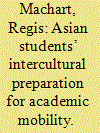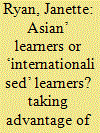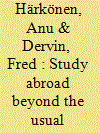|
|
|
Sort Order |
|
|
|
Items / Page
|
|
|
|
|
|
|
| Srl | Item |
| 1 |
ID:
145521


|
|
|
|
|
| Summary/Abstract |
Many academic contributions on Asian students abroad focus on their lack of interactions with the local population and their unpreparedness for intercultural encounters. Asian students appear as socially deficient and unfit for the new environment. These assumptions are problematic because they do not take into consideration the input prospective students receive prior to their departure through institutional training and unsupervised research on the host country under the student’s own initiative or a mix of both. Representations are also based on cultural differentialism which locates individuals in distinct, boundary-making categories, thus silencing most forms of individual diversities in the home and host societies. The main question arising thus deals with the kind of input that Asian future mobile students acquire, which is susceptible to impact their intercultural experiences. Data used for this article come from three different sets of interviews with Asian mobile students. Using a critical discourse approach, the discourses of these students are analysed from the perspective of their preparation to move to the host destination. Recurrent othering processes—both from institutional actors and from the students themselves—appear prior to departure, independent of the students’ origin and destination. Rather than blaming students, it would be more significant to look at what materials are available for them prior to their departure.
|
|
|
|
|
|
|
|
|
|
|
|
|
|
|
|
| 2 |
ID:
145518


|
|
|
|
|
| Summary/Abstract |
The contemporary context of higher education around the world is characterised by increasing international ‘contacts’ between higher education systems. These include increased ‘flows’ of international students, as well as rapidly growing numbers of academic collaborations through international research partnerships and transnational teaching programmes. Yet, much of the literature on international students tends to focus on how international students, and Chinese students in particular, may lack particular Western academic knowledge and values. Identifying groups as, for example, ‘Asian’, ‘Chinese’ or ‘Confucian culture heritage’ learners runs the risk of stereotyped views of international students and the desirability (for all students) of attaining only ‘Western’ academic knowledge and skills. The rise in the internationalisation of universities around the world has seen not just an increase in international student numbers, but changes to the ‘four Ps’ of higher education: policies, programmes, pedagogy and partnerships. Interestingly, the direction of student flows is beginning to change from mainly ‘east’ to ‘west’, and there is a growing interest in how these interactions can lead to more globalised and intercultural learning outcomes not only just for international students, but also for local students and staff. This article draws on theories of transculturalism, contact theory and the core principles of the UK Higher Education Academy’s Internationalising Higher Education Framework. In the context of the proliferation of universities’ internationalisation policies and the increasing cultural diversity of university staff and student populations, these theories and principles can provide a foundation for examining how increased contact between Western and Asian higher education systems can lead to learning and knowledge outcomes that can better serve individuals and organisations in the current ‘global era’. It reports research that illustrates how academics’ notions of ‘scholarship’ and ‘learning’ in both contexts are either shared or differ and points to how the common academic values can be the basis for mutual understanding, and the differences can be the source of mutual learning.
|
|
|
|
|
|
|
|
|
|
|
|
|
|
|
|
| 3 |
ID:
145519


|
|
|
|
|
| Summary/Abstract |
Global higher education is now situated in an open information environment in which national borders are routinely crossed and cultural identities are constantly shaped through encounters with diverse others. With over 4.5 million students on the move, pedagogical implications are potentially profound to the knowledge structure which so far has been largely affected by a single-dimensional version of history. Located at the very centre of current critical debates on higher educational pedagogy is the most contested issue of ‘critical thinking’ which has been credited as the essential attribute of graduates by all universities in Australia. In management practice, university policy makers have taken up ‘critical thinking’ to benchmark against the deficiency scenario often associated with international students, a large cohort of which come from Asia. This paper engages with the current critical debates and examines three aspects of ‘critical thinking’, the practices of teaching, doing and defending ‘critical thinking’ in university classrooms. In contesting ‘critical thinking’ as the essential attribute of graduates in the Western educational paradigm, this paper argues for an urgent need for a transcultural approach to think critically about the practice of ‘critical thinking’ and for an alternative pedagogical approach to global knowledge domains and knowledge production.
|
|
|
|
|
|
|
|
|
|
|
|
|
|
|
|
| 4 |
ID:
145517


|
|
|
|
|
| Summary/Abstract |
A large amount of literature critiquing the nature and practice of higher education has emerged in the wake of globalisation. This special issue represents a range of intellectual debates around the challenges facing educators in globalised higher institutions, especially where Asian international students are concerned. Read together, the four articles contribute to an emerging body of critical research which de-essentialises solid forms of educational imaginary and embraces heterogeneity of knowledge domains and pedagogy in the ever-changing universe. With a shared vision of providing a high quality, equitable, and global learning experience for all students, these papers interrelate through four parameters: (1) pluralising the disciplinary knowledge base and diversifying curricula and programmes for all students to serve the global community, (2) calling for a progressive pedagogy which takes into account the ‘transcultural’ flow of knowledge on campus and offers students an equal access to quality-orientated education, (3) problematising the ‘imagineering’ of study abroad and proposing a reshaping of research and teaching practices away from a ‘pure’ cultural and intercultural preparation of mobile students and cultural essentialism, and (4) taking into consideration of the fluidity and personal agencies and internationalising effect of international students and moving beyond methodological nationalism.
|
|
|
|
|
|
|
|
|
|
|
|
|
|
|
|
| 5 |
ID:
145520


|
|
|
|
|
| Summary/Abstract |
This paper problematizes the imagineering of study abroad, especially in terms of set objectives and learning outcomes. The authors propose a shift away from a ‘pure’ cultural and intercultural preparation of mobile students, which tends to ignore the fact that unrealistic expectations and preconceived ideas about study abroad can be as much of a hindrance as e.g. ‘culture shock’. The concept of imaginaries is used to prepare international students, some from Asian countries, to reflect on, discuss and ‘reform’ their perceptions of study abroad. Imaginaries, which are constitutive of human beings living in groups, are of course necessary components of the study abroad experience. The results show that the students are able to deconstruct critically their own as well as others’ doxic discourses on the characteristics of study abroad. Yet at the same time, as one should expect, the students develop new imaginaries on mobility. We argue that by allowing them to develop more counter-narratives about study abroad—and thus multiplying imaginaries—the students can feel more apt to face the complexities and contradictions of the study abroad experience.
|
|
|
|
|
|
|
|
|
|
|
|
|
|
|
|
|
|
|
|
|